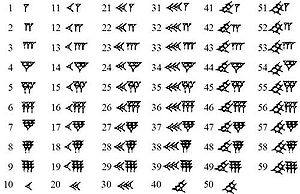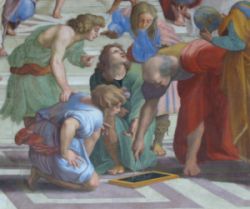November 30th December 1, 2008
Posted by Tatyana Malysh in Uncategorized.trackback
It looks like in the real life the result actually depends on the components. What a predicament! How we can trust it then? OK Let’s agree to leave the real life and stay in the boundaries of the abstract mathematics. The fellows Ancient Greeks called it “pure mathematics”. What the difference? One of those Greeks that is known by name Plato said that the regular mathematics (that used for real life problems) is appropriate for business men and men of war who “must learn the art of numbers or he will not know how to array his troops,” while arithmetic (the abstract one) was appropriate for philosophers “because he has to arise out of the sea of change and lay hold of true being.”[1] In the other words, it is very valuable for nothing but pure beauty. What nice about it, here one can operate on the abstract symbols: numbers. The numbers are good; they have no surprises, at list not in Ancient Greek. 1+1 here is 2 for sure.
Since Plato it took quite a while to mathematicians to begin to assume that there is no such a thing as “pure mathematics”. The suspicions that all derives from the Mother Nature struck them again and again. Finally, they started to catch that if mathematical rules do not explain some phenomena in the real world, they ought to be adjusted. I really want to expand it theme in a future.
Today, however, I want to start with the numbers, and not with these ones that we used to work with. The numbers are very old conception, much older than Plato, and they were invented guess for what? Exactly, for counting. The first ones came from Babylon. They were rather different from ours, say, nothing common. It is perfectly understandable to count fingers (10 different numbers) or even holes between the fingers (8 different numbers). I have no idea what counted Babylonians, but these guys had 60 different numbers. Can you imagine studying multiplication table 60 on 60? Pure Babylonian kids, although, the numbers themselves were quite simple: they had:

So, all sixty numbers looked this way:


Thank God. If I was born in Babylon, I don’t think I could pass any math class. Babylonian numbers look really complicated.
It is interesting most famous ancient philosophers are also mathematicians. However now, philosophy seems like far from mathematics. I don’t know why…
chanhee